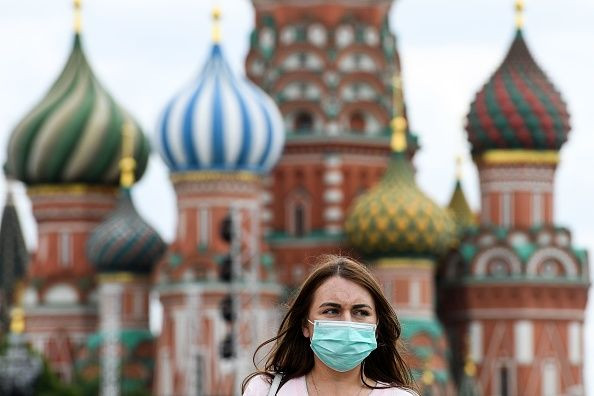Questions Surround Russia's Ability To Deliver A Safe, Effective Coronavirus Vaccine
As global coronavirus cases top 19 million, the world is racing to develop a vaccine to combat COVID-19. While there are at least 165 vaccine candidates in development the World Health Organization (WHO) has said, Russia has said it is nearing approval of a COVID-19 vaccine that could be released as early as Monday.
The vaccine, developed by Gamaleya Institute, along with the Russian Direct Investment Fund, is said to be in early human trials. The adenovirus-based vaccine is expected to win regulatory approval in Russia while large-scale trials are underway by Monday and no later than next Saturday, with inoculations expected to begin in October, Reuters reported.
The U.S., by contrast, has said that it expects to deliver a vaccine by the end of 2020 or early 2021.
The WHO lists six vaccines approved for Phase 3 clinical trials. The Russian COVID-19 vaccine is not among them and is viewed skeptically.
Some suggest that the vaccine may not be safe – or effective.
“It's obvious that the Russians are rushing the vaccine to market without adequate testing,” David Eugene Williams, president at Health Business Group, told International Business Times in an email. “It's possible that the vaccine will work, but there hasn't been enough time to verify that it's both safe and effective. The Russians haven't released any data that would support their claims.”
While it is not a surprise that Russia is in the process of developing a vaccine to treat COVID-19, the lack of information coming out of Russia about the vaccine also prompts more questions.
“A number of COVID-19 vaccines have been developed around the world, so it should be no surprise that the Russians have developed one,” Scott C. Ratzan, a physician and distinguished lecturer at the CUNY School of Public Health and Health Policy, told IBT in an email. “However, it is simply not possible to have completed the extensive safety and efficacy studies required to assure that the Russian vaccine can provide the level of community protection needed.”
Ratzan also said there could be a lack of acceptance in Russia to receive the vaccine.
“We have done some global consumer research that is under academic review, and generally speaking, the Russian people are highly skeptical about any COVID-19 vaccine,” he said.
While Russians may be unwilling to receive the vaccine despite approval from health officials, others around the world could consider traveling to the country to receive an inoculation despite warnings. But Williams suggested there would be few takers.
“I don't think people will travel to Russia to receive the vaccine because, 1) they won't trust that it will work, 2) they could get COVID-19 on their travels to Russia, and 3) the Russians may allocate it to their own citizens,” he said.
WHO also warned against a vaccine that has been developed too quickly. Spokesman Christian Lindmeir told reporters: “Sometimes individual researchers claim they have found something, which is of course, as such, great news. But between finding or having a clue of maybe having a vaccine that works, and having gone through all the stages, is a big difference.”
Safety of a COVID-19 vaccine is also a serious concern as the cost to human lives could be significant if the drug is not properly tested.
“Vaccines have to be very safe to be worthwhile,” Williams said. “As a hypothetical example, maybe 10 percent of people are expected to be infected with COVID-19, but 100% would be expected to get the vaccine. Even if the vaccine harms just one in 1,000 people, that is a lot of people and potentially more than COVID. It would be better to wait another few months for a vaccine that is proven to be safe and effective.”
Ratzan cited further risks.
“A vaccine may not necessarily be lethal or ineffective, but could have side effects that must be monitored in the phase 3 trials and beyond, reviewed by third parties and health authorities, with appropriate time/duration and designed trials,” he said.
Russia has also been accused of nationalism as it looks to be the first country to release a COVID-19 vaccine. Russian Direct Investment Fund’s Kirill Dmitriev denied any attempt to enhance national prestige, telling CNN, “No corners are being cut.”
But others disagree and accuse Russia of trying to gain the spotlight.
“Some countries, including the U.S. and Russia, have failed to control the virus using traditional public health measures,” Williams said. “They want to catch up with much of Europe and Asia and see a vaccine as a silver bullet. If they can be first, it erases some of the stigma of doing so badly with the public health response.”
Russia is approaching 1 million positive cases of the coronavirus, with COVID-19 deaths approaching 15,000, according to data from Johns Hopkins University.

© Copyright IBTimes 2024. All rights reserved.





















